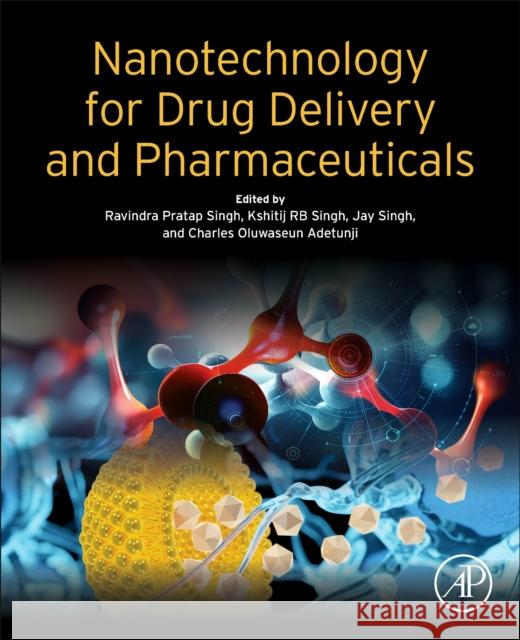Nanotechnology for Drug Delivery and Pharmaceuticals » książka



Nanotechnology for Drug Delivery and Pharmaceuticals
ISBN-13: 9780323953252 / Angielski / Miękka / 2023 / 525 str.
Wydanie ilustrowane
Part 1: Targeted Drug Delivery
1. Introduction to drug-delivery techniques based on nanotechnological approaches
2. Methods for fabricating various Nanocarriers for targeted drug delivery
3. Biologically synthesized nanocarriers for targeted drug delivery applications
4. Nanomedicine and Nanocarriers for Cancer treatment
5. Role of Nanocarriers for inflammation treatment
6. Nanocarriers and Nanomedicine for neurodegenerative disorders
7. Potentialities of Nanomedicine and Nanocarriers for infectious disease treatment
8. Utility of Nanomedicine and Nanocarriers for non-infectious disease treatment
9. Passive and active targeted drug delivery strategies
10. Utility of various drug delivery systems and their advantages and disadvantages
11. Clinical applications and future clinical trials of the drug delivery system
12. Advantages of nano-drug targeting than conventional dosage system
Part 2: Pharmaceuticals
13. Role of nanotechnology in the pharmaceutical industry
14. Recent development in the pharmaceutical industries
15. Strategies to synthesize pharmaceutical nanoparticles
16. Biologically synthesized pharmaceutical nanoparticles
17. Advantages and disadvantages of pharmaceutical nanoparticles
18. Recent market trends of nano-based pharmaceutical products
19. Recent pharmaceutical patents based on nanotechnological aspects
20. Perspectives, safety issues, legal factors of nano-based materials utility in pharmaceutical applications
Dr. Singh received his B. Sc. from Allahabad University India and his M.Sc and Ph.D. in Biochemistry from Lucknow University, India. He is currently working as an Assistant Professor in the Department of Biotechnology, Indira Gandhi National Tribal University, Amarkantak M.P. India. He previously worked as a scientist at various esteemed laboratories globally, namely Sogang University, IGR, Paris, etc. His work and research interests include biochemistry, biosensors, nanobiotechnology, electrochemistry, material sciences, and biosensors applications in biomedical, environmental, agricultural and forensics. Dr. Singh authored over 30 articles in international peer-reviewed journals and more than 20 book chapters of international repute, and he serves as a reviewer of many reputed international journals and is also a member of many international societies. Mr. Singh is a Postgraduate in Biotechnology from Indira Gandhi National Tribal University, Amarkantak, Madhya Pradesh, India. He is currently working in the laboratory of Dr. Ajaya Singh, Department of Chemistry, Government V.Y.T. PG. Autonomous College Durg, Chhattisgarh, India. He has many publications to his credit and has authored more than ten book chapters published in the internationally reputed press, namely Elsevier, Springer Nature, and CRC Press. He is currently also involved in editing books with international publishing houses, including CRC Press, IOP Publishing, Elsevier, and Springer Nature. His research interest is biotechnology, biochemistry, epidemiology, nanotechnology, nanobiotechnology, biosensors, and materials sciences. Dr. Jay is an Assistant Professor at the Department of Chemistry, Institute of Sciences, Banaras Hindu University, Varanasi, UP, since 2017. He received his Ph.D. degree in Polymer Science from Motilal Nehru National Institute of Technology in 2010 and did MSc and BSc from Allahabad University, Uttar Pradesh, India. Dr. Jay has published 55 international research papers and has completed/running various research projects in different funding agencies. His research work findings are also presented in various National (20) and International (26) platforms such as conference/seminar/symposiums etc. He has many edited/authored books (under pipeline) and has authored more than six book chapters of internationally reputed press for publications, namely Elsevier, Springer Nature, IOP and CRC. His research has contributed significantly towards the fundamental understanding of interfacial charge transfer processes and sensing aspects of metal nanoparticles. Dr Charles Oluwaseun Adetunji is presently a faculty member and lecturer at the Microbiology Department, Faculty of Sciences, Edo State University Uzairue (EDSU), Edo State, Nigeria. He was formally the Acting Director of Intellectual Property and Technology Transfer, the Head of department of Microbiology, Sub Dean for Faculty of Science and currently the Chairman Grant Committee and the Ag Dean for Faculty of Science, at EDSU. He is a Visiting Professor and the Executive Director for the Center of Biotechnology, Precious Cornerstone University, Ibadan, University. He has won several scientific awards and grants from renowned academic bodies like Council of Scientific and Industrial Research (CSIR) India, Department of Biotechnology (DBT) India, The World Academy of Science (TWAS) Italy, Netherlands Fellowship Programme (NPF) Netherlands, The Agency for International Development Cooperation; Israel, Royal Academy of Engineering, UK among many others. Dr Adetunji was ranked among the top 20th position among 500 prolific authors in Nigeria between 2019 till date by SciVal/SCOPUS. He was recently appointed as the President and Chairman Governing Council of the Nigerian Bioinformatics and Genomics Network Society. He was recently appointed as the Director for International Affiliation and Training Centre for Environmental and Public Health, Research and Development, Zaria. He is an editorial board member of many international journals and serves as a reviewer to many double-blind peer review journals like Elsevier etc. Dr Adetunji is a member of the American Society for Microbiology, Biotechnology Society of Nigeria, and Nigerian Society for Microbiology, and he is presently the General/Executive Secretary of Nigerian Young Academy. He is the president and founder of the Nigerian Post-Harvest and Food Biotechnology Society.
1997-2026 DolnySlask.com Agencja Internetowa
KrainaKsiazek.PL - Księgarnia Internetowa









